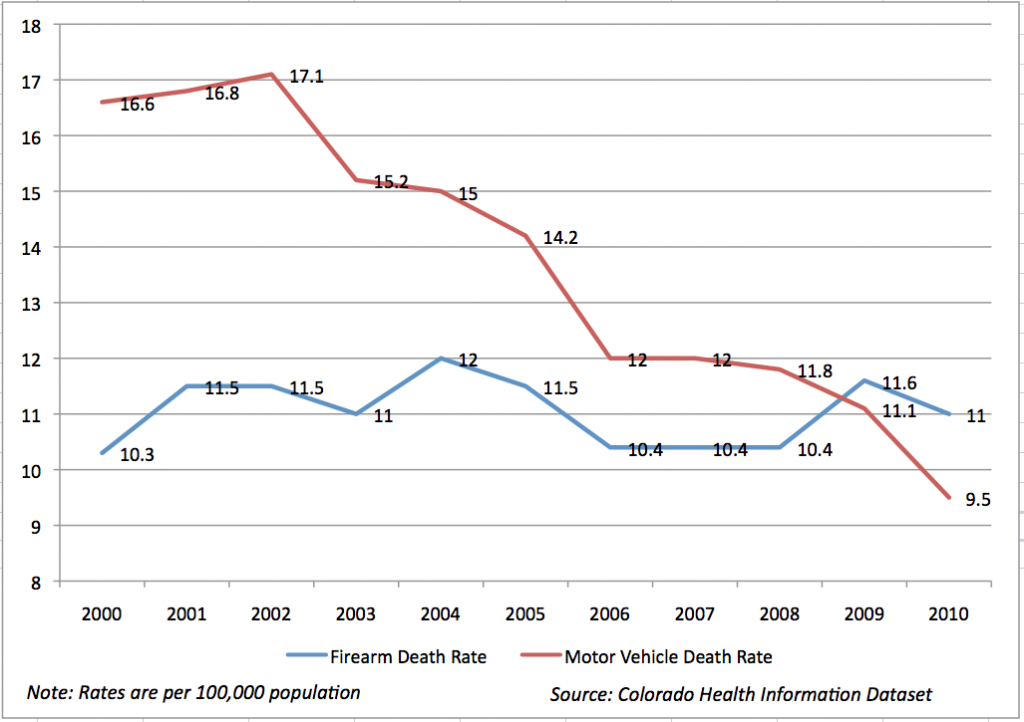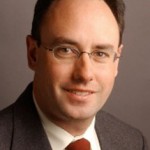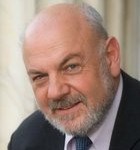By Katie Kerwin McCrimmon and Diane Carman
Colorado leaders have failed to tackle gun fatalities as a public health threat and gun deaths in Colorado and nine other states now exceed automobile fatalities, according to data from the U.S. Centers for Disease Control and Prevention and the Violence Policy Center.
Coloradans are reeling from the Aurora theater massacre, the third mass shooting here since 1999 when Columbine shattered the countrys psyche. Yet Colorados governor told a national television audience on Sunday that he thought there was little that could have been done to prevent the recent killings, and conspicuously absent from the states 10 winnable public health battles is any mention of gun deaths.
Delbert Elliott
Colorado could do something to deter gun violence, said Delbert Elliott, director for the Center for the Study and Prevention of Violence at the University of Colorado in Boulder. The tragedy in Aurora has highlighted for some people that we dont ban assault rifles. We dont have controls on ammunition purchases.
Colorado health leaders should look at California as a model, says gun opponent, Kristen Rand, legislative director for the Violence Policy Center, a gun violence prevention center based in Washington, D.C.
California is where this whole history of horrific mass shootings started. Now, apparently, Colorado is the capital with Columbine and the theater shooting. Colorado needs to move aggressively to implement a real assault weapons ban and restrictions on high capacity magazines, she said.
Its certainly going to happen again until people stand up and say weve had enough bloodshed. Kristen Rand, Violence Policy Center, Washington, D.C
Its certainly going to happen again until people stand up and say weve had enough bloodshed, Rand said. Gov. Hickenlooper should sit down and look through some gun catalogs and Internet sites and see what is being marketed and see what people in Colorado are buying. If he did, hed be frightened. This is not going to end with this shooting.
James Holmes, the neuroscience student accused of killing 12 and injuring 58 in Aurora last week, legally purchased assault weapons and more than 6,000 rounds of ammunition over the Internet. According to police, he had those packages delivered undetected to his home and school. Had Holmes military-style weapon not jammed, police have said he could have mowed down scores more people who were trapped in the dark theater.
Colorado officials from the federal Bureau of Alcohol, Tobacco, Firearms and Explosives refused to comment on Holmes recent gun and ammunition purchases citing a gag order as prosecutors make their case against Holmes. Colorado representatives of the National Rifle Association and Dudley Brown of the Rocky Mountain Gun Owners did not return calls from www.HealthPolicySolutions.

Public health prevention efforts have driven automobile deaths down in Colorado and across the U.S. while gun deaths have increased.
Weakest gun control laws of developed countries
Public health experts say the markedly different trends in auto and gun deaths are telling. In one case, experts in government and industry have worked together to make driving much safer, with sweeping efforts to mandate seat belts, combat drunk driving and limit teens driving with other teens. In Colorado, for example, safety measures have cut the rate of auto deaths in half since 1995.
10 states where gun deaths outpace auto fatalities
- Alaska
- Arizona
- Colorado
- Indiana
- Michigan
- Nevada
- Oregon
- Utah
- Virginia
- Washington
Source: Violence Policy Center
But, when it comes to deaths from firearms, there has been no concerted effort to limit gun purchases or even to address violence prevention, safe guns storage or gun safety and education measures that all sides support. As a result, rates of deaths by firearms continue to climb.
David Hemenway
We have by far the weakest gun control laws of any developed country, said David Hemenway, professor of health policy at the Harvard School of Public Health who has made the public health issue of guns a focus of his research throughout his career.
Unlike the broad-based approach to reducing traffic fatalities, we have almost no money for research, Hemenway said. The CDC is afraid to even say the word guns.
In Colorado, gun deaths have been climbing, rising from about 440 in 2000 to about 550 in 2010, according to data from the Colorado Health Information Dataset. Meanwhile auto deaths are declining, down from 714 in 2000 to about 480 in 2010, even as Colorados population grew from about 4.3 million to just over 5 million during that decade.
Colorado has relatively low homicide rates compared to the rest of the country, but has one of the highest suicide rates in the U.S. More than half of the men who commit suicide use a gun, while one-third of women kill themselves with a gun.
We have by far the weakest gun control laws of any developed countryThe CDC is afraid to even say the word guns. David Hemenway, professor of health policy, Harvard School of Public Health
Prevention is the cornerstone of winning any public health battle, Hemenway said.
You clearly try to think about prevention instead of just waiting for a crime to happen and prosecuting it, he said. The public health effort tries to go as far upstream as possible and think of all the ways to prevent serious problems from happening.
Scientists often use the motor vehicle analogy, he said. To reduce vehicular deaths, communities dont just focus on drivers, but on the safety features of vehicles and highways, the availability of emergency medical care, education, law enforcement and other ways to reduce deaths and injuries.
Nobody thinks drivers are any better than they were when I was growing up, Hemenway said, but over the past 60 years, weve reduced deaths per motor vehicle mile driven by 90 percent.
In contrast, Americans are reticent to tackle gun deaths. But efforts elsewhere have been effective. Hemenway pointed to successful measures in Australia.
From 1979 through 1996, 13 mass shootings were reported across Australia. Since 1996, when stringent gun-control laws were implemented, including a mandatory buy-back of all semi-automatic firearms, no mass shootings have occurred.
Civil libertarians in Australia think were crazy to equate liberty with gun ownership, Hemenway said. They say theres no freedom if youre afraid to go out on the street at night.
While legislation to restrict access to guns is unlikely in the U.S., Hemenway said efforts to change social norms around guns could have some effect. He cited the highly effective designated driver campaign over the past several years.
We want an 11th commandment for gun safety that says friends dont let friends who are going through a rough spot have easy access to guns, he said.
Hemenway said the movie theater mass shooting reveals just how difficult it is to identify deranged killers before they act.
It doesnt look like it ever will be very easy to figure out whos going to do this, he said. The easiest way to prevent these incidents is to prevent people from having legal access to these incredibly lethal weapons, like they did in Australia.
Gun proponents say weapons save lives
Proponents of gun rights say the fallacy of the public health argument is that guns can also save lives.
Dave Kopel, research director for the Independence Institute, associate political analyst for the Cato Institute and an adjunct professor of law at the University of Denver Law School, said he has been following the debate about the public health issues surrounding guns for 25 years.
The public health thinking says that when you have gunshot injuries the cause is bullets hitting people, he said. But there are a couple of problems with that.
One, he said, is that guns work both ways.
In the wrong hands, guns are really dangerous and destructive, but in the right hands, guns are enhanced public safety.
Kopel said the reason the gun control issue is not that big a deal in the public debate is that through compromise and consensus we have decided to protect lawful use, especially defensive use.
In the wrong hands, guns are really dangerous and destructive, but in the right hands, guns are enhanced public safety. Dave Kopel, research director for the Independence Institute, associate political analyst for the Cato Institute and an adjunct professor of law at the University of Denver Law School.
The public health analysis in my view is too one-sided. It looks only at the downside. It doesnt look at the other side.
Kopel said any analysis of the roles of guns in public health should be holistic.
Politicians dont want to go near guns
Yet, says John Straayer, a political analyst and professor at Colorado State University, the idea that guns make people safer has never proven true in mass killings. Theoretically people in the Aurora theater could have been armed.
I dont remember anybody firing back in any of these instances. It doesnt happen.
Straayer said the gun lobby has wielded its power successfully here and across the country.
The NRA is maybe the most powerful interest group in Colorado. The bills weve had in the legislature have loosened rather than tightening any kinds of restrictions on guns.
While Straayer absolutely supports gun control measures himself, he thinks its unlikely that politicians here or elsewhere will forge ahead on the issue.
They dont want to go near it, even when you talk about issues like safety locks, Straayer said.
The gun lobby has done a masterful job of convincing politicians that any conversation about safe storage of weapons or safety locks is a slippery slope.
Theres not a real vested, organized, consistent and persistent constituency for it, Straayer said.
So, support for controls tends to flare up after an incident like Columbine or the Aurora theater shooting, then attention fades and the public forgets.
Straayer thinks thats because mass killings are so rare and people naturally assume they will never be the victim of such an event. They are much more invested in day-to-day issues like gas prices and unemployment rates.
While Hickenlooper has drawn some criticism for hedging on whether Colorado could have done anything to prevent the Aurora tragedy, Straayer said he probably did the judicious thing.
He kept the focus on the victims and the victims families, caring about them and coming together, Straayer said. Using (Aurora) as a launching pad for legislation in that context wouldnt have been well-received.
Nonetheless, Straayer thinks the governor and public health leaders must take the opportunity in coming weeks to more closely analyze why Colorado has been the setting for yet another mass killing and how public policy could help prevent future mass shootings, along with much more common gang incidents, fights and domestic violence that leave well over one person a day dead in Colorado from guns.
Dr. Chris Urbina, executive director and chief medical officer of the Colorado Department of Public Health and Environment, declined to talk about gun safety as a public health issue. His spokesman also declined to respond to questions about why gun safety is not one of Colorados 10 winnable battles.
Straayer said elected officials and those in the public sector are reticent to lead.
Leadership is all about getting the public to care about things. I think thats a sadly-missing element in modern American politics. You run polls to see what people think and if theres support there, you run with it because it pays off with votes.
Suicide and motor vehicles death among the young
- Suicide is the leading cause of death among young people in Colorado ages 15 to 24.
- Motor vehicle crashes are the second leading cause of death among young Coloradans.
- For the first time, in 2010, there were more suicides among the young than fatal car crashes.
- Suicides in Colorado: 867 in 2010, down from record peak of 940 in 2009)
- Rank nationally: 6th highest in the U.S. Highest suicide rates are in Alaska, Montana, New Mexico, Wyoming, Nevada, then Colorado. Why? Click on our earlier coverage: Record suicide toll rocks Colorado. Could altitude be to blame?
Source: Colorado Department of Public Health and Environment, Office of Suicide Prevention
Thats not leadership. Thats political careerism.
To some extent, Straayer thinks the Aurora killings are a sad coincidence. But the summer of 2012 has been a heartbreaker.
Its been fires, fires, fires and tremendous destruction. We just get over that and the skies clear and now this happens. (President) Obama had a jump on a plane twice in a month to console us, he said.
After Columbine, nothing was done
David Winkler of Thornton was a founding member of the gun-control advocacy group SAFE Colorado after the Columbine shootings. He now does public policy research.
After the Columbine shootings, I got involved. I was a high school student at the time and hadnt been very political before then.
I started driving to high schools and meeting people in parking lots, inviting them to get involved.
Students from SAFE Colorado went to Washington, D.C., the summer after Columbine and met with members of Congress, President Clinton and Vice President Al Gore.
At the federal level, nothing was done, Winkler said. In fact, some laws already on the books were allowed to expire.
In Colorado, SAFE succeeded in getting an initiative on the ballot to close the gun-show background check loophole. Amendment 22 passed with support of 70 percent of the voters, one of the most popular initiatives in the states history, Winkler said.
A lot of people blame gun owners and the NRA (National Rifle Association) for the easy access to firearms in the United States. But thats misleading. The largest influence comes from the industry gun and ammunition manufacturers, sellers and dealers. Their push is for more guns sold and more bullets in the magazines. They want almost no limits on that.
So much of whats sad about this debate is that people are saying no one thing could have stopped it. But there are lots of things that might make the next crazy person not have access to so much firepower.
Preventing violence in children
Ken Gordon, who was minority leader in the Colorado House in 1999, carried a bill calling for mandatory background checks for anyone purchasing firearms at gun shows. The measure died in the Appropriations Committee for lack of support.
Most people of both parties are afraid theyll lose elections based on this issue, said Gordon.
While leaders were skittish about supporting most gun control measures in 1999, Gordon said its worse now.
With so much money in politics, it selects for people who dont have strong principles and are willing to cater to special interests.
The gun lobby makes a living by frightening law-abiding hunters into believing that liberals from Boulder and San Francisco and New York are going to take away their guns, Gordon said, when the point is to stop people from having assault weapons and 100-round clips because theres absolutely no good reason for them to have them.
Gordon now works with CleanSlateNow.org, an organization that mobilizes support for candidates who dont accept money from special interest groups.
For Del Elliott, the key to prevention goes far beyond guns. His violence policy center supports programs proven to work with young children.
The problem now is that school leaders are so focused on boosting test results that many are not carving out the time to teach children about non-violence and bullying prevention.
Elliott is also a big believer in anonymous tip lines. He cites the work of Safe2Tell, a Colorado-based hotline that started after Columbine. Since 2004, tips to Safe2Tell have prevented 28 planned school attacks.
Even in these mass shootings, someone almost always knows its about to happen. They know that plans are being made. We dont know yet if thats the case for the Aurora shooting, Elliott said. But, if any law enforcement person had known all of the things that we now know about Columbine, there would have been an intervention.
We have to make much better efforts on prevention, Elliott said. If we can raise our children to believe that violence is not a solution to the difficulties that they face, if they never consider that as an option, then gun control ceases to be an issue.


